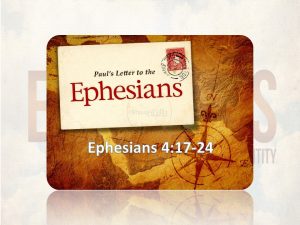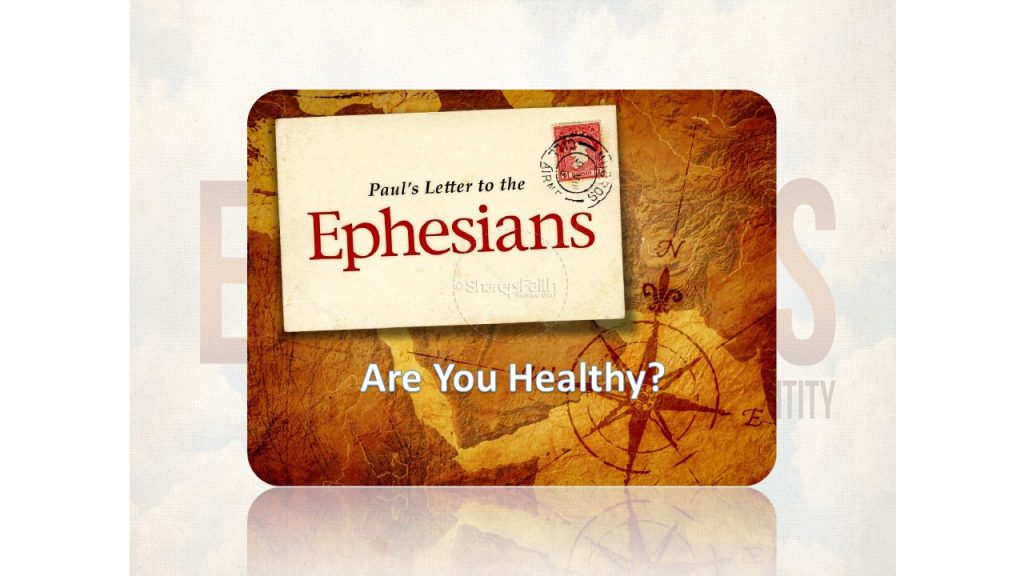
Ephesians 4:17-24
Who are you Wearing?
One of Hollywood’s silliest oddities occurs during awards ceremonies, when actresses walking the red carpet are asked, “Who are you wearing?”, and they attribute their dress or lack of dress, to the name of some overpaid designer.
However, it really is a relevant question for us today in light of what God’s Word says in Ephesians 4.
In the Old Testament, we frequently see the metaphor of God being clothed in Majesty. The Apostle Paul used the illustration of putting off the old and putting on the new, to describe the Christian experience.
Paul is exhorting his readers to be transformed and no longer live the way they did before making Jesus Lord of their lives (see Ephesians 4:17).
In verses 18-19, Paul reminds the Ephesian Christians of what life was like before they knew Jesus as Lord. the overarching theme of these verses is “futility” (see Ephesians 2:1). These two verses in chapter 4 are hard to absorb and describe an ever-deepening pit of despair and hopelessness for those who deny Christ.
The first century world was a depraved time and people had little or no moral compass. In the twenty-first century, we know that Paul could be describing people in our own cities and neighborhoods, people darkened in their understanding and alienated from God. People are ignorant because they have made the choice to harden their hearts towards God.
Left to our human nature, we are sinful and do not even have a desire for God. The normal human condition, apart from a relationship with Jesus Christ is vile, even though it may seem that some people are less vile than others. We worship ourselves and only think about what will make our lives more pleasurable. Calvinists call this total depravity. We only have a desire to know our creator because He places that desire in us by His Spirit.
But the good news is that the next five verses, beginning with verse 20, describe the wonderful truth that God can transform anyone. In Christ we are new creations, behaving differently to those around us.
In these few verses the Apostle Paul uses three images to describe the transformation that takes place as we become followers of Jesus.
- A Place of Education.
This is not formal education – this is transformational education. Life change more than knowledge transfer.
In verse 20, Paul uses the phrase, “you have learned Christ”. Christ Jesus is the subject matter of the education.
But notice the verse does not say, “you have learned about Christ”. Christianity is not knowing about a person; it is knowing and being taught by the person of Jesus. It is about a personal relationship with the risen Lord Jesus.
When I became a Christian, I did not gain some new knowledge, the creator God spoke truth into my heart, and I began a relationship with him. Have you come to know Jesus? Rather than knowing about Jesus. Christianity is about knowing the truth and the truth is a person (see John 14:6).
JB Philips in his paraphrase translates the verses 20-21, “But that isn’t the way Christ taught you, if you have really heard his voice and learned from him the truths concerning himself.”
2. There is a clothing change.
In verses 22, 23 and 24 Paul writes, “take off the old self”, “be renewed in the spirit of your minds”, and “put on the new self”(see also Colossians 3:8-10).
The verb tense in Colossians 3:8-10 indicates a completed work with ongoing action. When you and I submitted to the Lordship of Jesus Christ, we put off the old when we turned from our sins and followed Jesus. But there is the daily ongoing practice of saying no to sin and being renewed in the image of our creator.
Ephesians 4:24 describes putting on the new self like a coat of righteousness. God’s original design for mankind was to walk in perfect relationship with Him, when sin entered the world through the deception of Satan, that design was broken. But now, in Christ, we put on a new garment, we are literally re-created into His image, we put on the righteousness of Christ and have the access to God the Father as originally intended. We who are alive in Christ, filled with the Holy Spirit, have become a new person.
3. Our Renewed Mind.
The Apostle Paul writes in verse 23, “and to be renewed in the spirit of your minds.”
Again, the verb tense is in the present tense and we are, “being renewed in the spirit of our minds.”
This indicates an ongoing process of daily being renewed and transformed into the image of Christ.
When we become followers of Jesus, we receive all his righteousness. We are made new and washed by his shed blood. And then we grow more like him as we follow him. As we grow into Jesus, we reflect the glory of God by living holy righteous lives as His image bearers.
Practically, this happens as we spend time reading and soaking in God’s word, as we daily allow the Holy Spirit to have more control over our lives. God does the work in us, but we have the practical task of “Setting our minds on heaven” as we read in Colossians 3:1-3 and Romans 12:2.
The renewing of our minds is a miracle as we are daily surrounded by the garbage of the media world. A practical and necessary step we must take every-day is to pray for the Holy Spirit to renew our minds.
We need this more than ever before in history. There is a war for the mind, and we are too easily distracted by the never-ending digital world around us.
Being renewed is an essential part of being a follower of Jesus because he is the one you are wearing, and along with the cloak of righteousness comes the renewal of the Holy Spirit.
What are you wearing?






